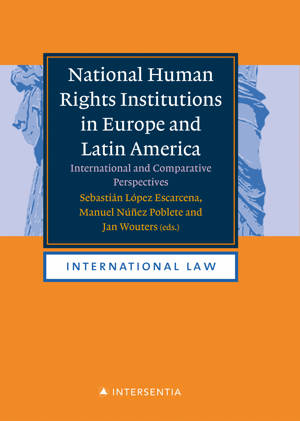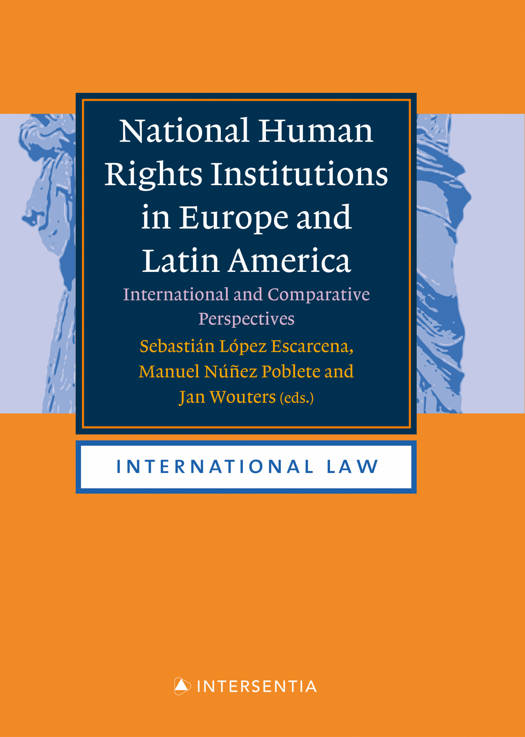
Bedankt voor het vertrouwen het afgelopen jaar! Om jou te bedanken bieden we GRATIS verzending (in België) aan op alles gedurende de hele maand januari.
- Afhalen na 1 uur in een winkel met voorraad
- In januari gratis thuislevering in België
- Ruim aanbod met 7 miljoen producten
Bedankt voor het vertrouwen het afgelopen jaar! Om jou te bedanken bieden we GRATIS verzending (in België) aan op alles gedurende de hele maand januari.
- Afhalen na 1 uur in een winkel met voorraad
- In januari gratis thuislevering in België
- Ruim aanbod met 7 miljoen producten
Zoeken
National Human Rights Institutions in Europe and Latin America
An International and Comparative Study
Lopez Escarcena Sebastian
€ 151,95
+ 303 punten
Omschrijving
Over the past 20 years, national human rights institutions (NHRIs) have moved from the periphery to the centre of the human rights debate. The potential of NHRIs to transmit and implement international norms at the domestic level, and to transfer human rights expertise to regional and global human rights fora, is increasingly recognised. In Europe, the continent with the widest variety and density of human rights protection mechanisms, NHRIs are also gradually gaining recognition as actors that can enable more comprehensive and effective human rights promotion and protection. Filling a gap in the legal literature, this book aims to bridge the gap between the European and Latin American experiences of national human rights institutions (NHRIs), exploring the impact that this has internationally. As such, it not only includes introductory chapters on the relationship between NHRIs and the United Nations, the European Union and the Inter-American Court of Human Rights, but also offers general contributions on other European and Latin American institutions and valuable deep dives into specific case studies on certain regional commissions, ombuds offices and institutes. In order to assess the distinct models these institutional organisations adopt, three of the major European NHRIs have been chosen: the Spanish Ombuds Office, which is especially relevant to Latin America; the French Commission, of great influence in the area; and the younger, and highly interesting, German Institute. The main Latin American NHRIs which adopt either an ombuds, a commission or an institute model are also analysed, including those of Argentina, Chile, Colombia, Ecuador, Mexico, Paraguay, and Uruguay. SEBASTIÁ N LÓ PEZ ESCARCENA Full professor of international law at the Pontifical Catholic University of Chile, and associate member at the Catholic University of Leuven (CGGS) and at the University Paris 1 (Panthé on-Sorbonne) (IREDIES). MANUEL NÚ Ñ EZ POBLETE Full professor of constitutional and international law at the Pontifical Catholic University of Valparaí so (PUCV), Chile. Substitute Judge at the Chilean Constitutional Court and former Board member of the National Institute of Human Rights of Chile (INDH). JAN WOUTERS Full professor of international law and international organizations, Jean Monnet chair ad personam, director of the Institute for International Law and Leuven Centre for Global Governance Studies, and administrator of the America Europe Fund, KU Leuven.
Specificaties
Betrokkenen
- Auteur(s):
- Uitgeverij:
Inhoud
- Aantal bladzijden:
- 384
- Taal:
- Engels
- Reeks:
Eigenschappen
- Productcode (EAN):
- 9781839703843
- Verschijningsdatum:
- 11/03/2024
- Uitvoering:
- Hardcover
- Formaat:
- Genaaid
- Afmetingen:
- 165 mm x 241 mm
- Gewicht:
- 710 g

Alleen bij Standaard Boekhandel
+ 303 punten op je klantenkaart van Standaard Boekhandel
Beoordelingen
We publiceren alleen reviews die voldoen aan de voorwaarden voor reviews. Bekijk onze voorwaarden voor reviews.









